- Home
- Anne Frasier
(2006) Pale Immortal Page 2
(2006) Pale Immortal Read online
Page 2
No answer.
Evan pressed harder. "Are you a member of the Pale Immortals? Did they send you? Is this some kind of initiation?"
The Pale Immortals were a gang of kids whose name paid homage to a previous resident named Richard Manchester, aka the Pale Immortal, who'd terrorized the town and slaughtered its residents. Some claimed Manchester had killed as many as a hundred victims, drinking and bathing in their blood. In the panic of the time, in the mass exodus from what was now called Old Tuonela, records had been lost, so no one really knew the death tally.
"What're you talking about, you weird-ass?"
The kid was shaking with fear. But he'd called him a weird-ass. Had to give him credit for guts. Or stupidity.
Evan relaxed his grip.
Was that a sob? Was the kid crying?
He released the boy's wrist and removed his knee from his spine. "Come on. You're okay."
"Fuck you."
The teenager looked up, his face splattered with mud, his eyes haunted while he tried his best to sound defiant. Even though the boy had run like hell and put up a strong fight, he looked fragile.
Now Evan felt bad. As if he was the one who'd done something wrong.
Here the kid had been prowling around his house, getting ready to break in—probably for the second time—and Evan was the one who suddenly felt like shit.
"Come back to the house. We'll find you some dry clothes and get this sorted out. Call your parents. Have them come and get you." If the boy didn't cause any more trouble, Evan wouldn't contact the cops.
In one swift motion the kid lunged and pushed Evan backward, then just as quickly jumped away.
It took Evan a second to realize the boy had his gun. And that he was raising it.
To his own temple.
Evan saw the bleak determination in the kid's eyes; he had every intention of pulling the trigger.
Time slowed.
Tick, tick, tick.
Evan may have shouted; he wasn't sure. He kicked, hooking his foot around the kid's ankle. The teenager was flung backward and crumpled to the ground at the same moment the gun discharged. The echo of the gunshot ricocheted from hillside to hillside.
Evan dropped to his knees. He checked the boy for signs of an entrance wound, but couldn't find any. Had the bullet missed? Had he hit his head? Or passed out?
Evan pressed two fingers to the boy's neck. Even though his face was as pale as a corpse, his pulse was steady. The scene replayed in Evan's mind as he tried to grasp what had just happened.
The boy stirred. His eyes opened, and Evan let out a relieved breath. "Jesus Christ, kid. What the hell?"
The teenager didn't seem surprised to find that he wasn't dead. Live, die—it was all the same to him; that was obvious. "Are you Evan Stroud?" he finally asked.
"Yes."
"I have a message for you."
If it was anything like the one he'd just tried to give him, Evan didn't want it.
"I'm Graham."
"Graham?"
"Are you going to pretend you've never heard of me?"
Choose your words with care.
Evan had no idea who he was, but he didn't want to set him off again. The kid was staring at him with a directness Evan couldn't recall seeing in many adults. He also noticed that the night was fading.
The kid spoke again. "Your son," he spit out, as if the words left a rotten taste in his mouth. "I'm your son."
Evan fell back on his heels.
Punctuating that announcement, sirens began to wail from somewhere in the distance. As Evan listened they drew closer, then trailed off, heading toward downtown Tuonela, from the direction Evan had recently come.
Chapter 3
The siren shut off with one final squawk.
Damp wind blew down the collar of coroner Rachel Burton's jacket as she stood on the edge of the Tuonela town square. Hands in her pockets, she regarded the nude body of a female victim lying in a shallow ditch parallel to the road, a few feet from the base of a maple tree. If memory served Rachel correctly, it was one of those varieties of maples that turned a glorious shade of electric red in the fall. Right now it was leafing out, even though it was only early April. But enough of that. Enough of trying to distract herself from the horror in front of her.
The victim had been tossed like so much garbage. The scene reminded Rachel that no matter how the people of Tuonela tried, they couldn't ignore their history any more than London could ignore Jack the Ripper.
The headlights of two squad cars were aimed at the body, along with the beams of three flashlights. No one spoke. The only sound was the steady clang, clang, clang of a metal toggle against a flagpole in the center of the square. Nobody seemed to know what to do. Rachel sensed they were all waiting for her. She'd seen a lot of death, so it was only natural that they'd look to her for guidance.
"Who found the body?" she asked.
"We were on patrol," said a young male officer. "We circled the square twice before I saw it."
"Let me borrow your flashlight."
He passed it to her. She took a few steps closer, aware of the cold dew seeping through her sneakers. The victim's throat had been sliced. She directed the flashlight beam to the ground around the body.
No sign of blood.
Dying was often the only way people left Tuonela. Rachel had noticed that about the same time she'd started grade school. But Rachel had made it a point to get out. When she was little and people asked what she wanted to be when she grew up, she always said a doctor or teacher or nurse. "But not here. I want to be somewhere else. Somewhere far away." The adult asking the question would look baffled and chalk it up to weird things kids said. But Rachel had been serious. You had to fight the desire to stay. That had always been her goal: Get the hell out of Tuonela.
She'd made it as far as Los Angeles. Which was almost as far as a person could go without a boat.
Just keep going until the land stops.
She thought she'd gotten away; she really did. But then her mother became ill, and Rachel took a leave of absence from her job as coroner to come home and help her father. When her mother died, she was offered the combined position of county coroner and medical examiner. It was unusual but not unheard-of for one person to have both jobs. Especially in a place with few deaths and no murders. Even though she was only thirty-two, even though she'd been one of the best coroners in L.A. County, she'd decided to stay in her hometown.
Truth be told, she'd been getting tired of the relentless crime in L.A. But L.A. wanted her back. And in L.A., she could distance herself. This .. . this atrocity in front of her was almost like discovering you had a serial killer in the family.
Every few weeks she got a call from her old boss, telling her how things had fallen apart since she'd left, and asking what it would take to convince her to return. She knew she should go. Even her father seemed to understand that.
"Don't stay here for me," he'd told her more than once.
But it wasn't just her father keeping her here; the town had finally gotten to her. Her excuse to remain in Tuonela was that it was nice living in a town where the only deaths she saw were due to car accidents, hunting accidents, and natural causes.
Right.
Here was a violent murder in the heart of one of the most bucolic settings on earth.
"Could someone get my kit from the van?" she asked.
After putting on a Tyvek suit and slippers, she photographed the body and the surrounding area.
Her father, Police Chief Seymour Burton, came up beside her. He smelled like the cigarettes he pretended to no longer smoke. "The killing didn't take place here," he said.
She felt reassured by his quiet presence. Very few people could carry off being cool, but Seymour managed easily. He was James Dean if James Dean had lived to be seventy.
"No," Rachel agreed. "The body was dumped."
"And I'm guessing by an amateur. A first kill."
"But why dump a body in the middle
of town?" she asked. "Almost seems the killer wanted her to be found."
"Or panicked," Seymour said.
"Local?" Rachel mused aloud. "Or someone passing through?"
A nearby officer was listening. "Gotta be somebody passing through," he said with conviction.
Seymour eyed the officer in that slow way of his. "Why's that?" he asked, even though it was obvious he already knew the answer.
"Nobody here would do such a thing."
Seymour looked from the officer to the body. For a moment he didn't speak. "Don't ever think it couldn't be a friend or neighbor. Most homicides are committed by people who know the victim. Our job is to find out who may have wanted to kill her. We'll start with relatives and friends and go from there." His voice was smooth and placating, not in the least condescending. The officer nodded and ducked his head.
"Let's finish up and get the victim out of here," Rachel said. It bothered her that the young woman was lying there nude for all to see. That kind of bla- tant exposure was different in a small town, where there was little anonymity. In L.A. she wouldn't have felt the need to hurry and cover the body.
"Anybody recognize her?" Seymour asked.
"I... I think she goes—I mean, went to school with my son," an officer said. "Mason and Enid Ger-ber's kid."
There was a murmur of agreement.
They put up numbered crime scene cards.
The grass hadn't been packed down. There were no tire marks.
Two officers spread a plastic sheet on the ground next to the victim. On top of the sheet they placed a body bag. Rachel had wrestled with a lot of dead bodies, and they weren't known for their cooperation. Once the victim was in place, Rachel zipped the bag and attached an evidence seal.
Dan, Rachel's assistant and the closest Tuonela had to a crime scene investigator, began vacuuming the grass in hopes of finding some small piece of something.
From her kit Rachel pulled out a tool shaped like a small shovel. She crouched above the area where the body had been lying. Using the tool, she scraped and dug, depositing clumps of grass and dirt into an evidence bag.
"What are you looking for?" Dan asked.
Rachel was aware of her audience: patrol officers standing in a semicircle, watching, waiting.
"Blood."
"And...?" Dan prodded.
"Ground's too wet to tell."
"I can take care of that." He poked around in the evidence kit to lift out a plastic spray bottle of lumi-nol, normally used indoors to expose trace amounts of blood. Dan had probably been waiting months for a chance to use it.
He sprayed the area in question, then produced a small, battery-operated black light. Nothing. He sprayed again, then tested with the light.
Still nothing.
He looked up at Rachel, silently communicating his dark thoughts, sharp black bangs slanting across his forehead.
Dan was a native. Except for a couple of years interning at a forensic lab in Madison, he'd lived in Tuonela his entire life. Although hardly more than a kid, he understood the significance of the missing blood when you lived in a town that meant land of the dead, a town where the Pale Immortal had once walked.
Behind her, Rachel heard the metallic snap of a lighter and turned to see her dad taking a deep drag from a cigarette, his eyes unfocused and troubled. Was he thinking what she was thinking?
This, on top of a recent theft of blood from the hospital, wasn't proof of anything, she told herself. And not the time to verbalize her own concerns. "I'll know more once I've examined the body," Rachel said.
Normally she would have gone to her apartment and cleaned up a bit. Had some coffee and probably some breakfast, most likely at Peaches, because she hated to cook.
But she wasn't going to expose herself to the public with this horrific homicide having just taken place. People would stare. They would ask questions. They would be afraid. And she had no way to alleviate their fears.
She went directly to the morgue. It was the best place to hide.
Chapter 4
It was every guy's nightmare.
A kid showing up at your door, calling you Dad. Worse, a mentally unstable kid who'd just tried to kill himself with your own gun. Right in front of you.
The kid—Graham—was sitting at Evan's kitchen table, eating as if he hadn't had a meal in a week. Evan figured the least he could do was feed him.
Graham had changed into dry clothes He'd washed his hands, but his face and curly hair still bore traces of mud.
In the adjoining living room, beyond the bookcase divider, thick black curtains were pulled tight, the room illuminated with low-wattage incandescent bulbs. Evan was used to the murkiness; Graham didn't seem to notice.
It was strange as hell to have somebody sitting at his kitchen table, invading his space and filling the room with an alien presence, but certainly much more peculiar to have a teenager claiming to be his son.
"Your mother ..." Evan began, fishing for infor- mation, yet not wanting to set the boy off Evan needed details if he was going to be accused of being somebody's dad.
Graham looked up from his bowl of cereal. He wiped milk from his mouth with the back of his hand. "Lydia. Everybody calls her Lydia."
Lydia
That's what Evan had thought He pushed the box of cereal closer, but Graham shook his head. "You say she dropped you off, then left?" Evan asked.
"Yeah She always threatens me with you. Like, 'If you don't straighten up, you're going to live with your father.' We've driven partway here before."
To think that this poor kid had been carrying around some mental image of his father, yet there wasn't a man out there thinking about Graham. "What was different this time?" Evan asked.
"I didn't beg to go home."
"Where is home?"
"Arizona."
"That's a long drive."
"Thirty hours straight."
Years ago the same road had brought Lydia Yates to Tuonela and then taken her away. She'd been one of those girls who'd slept with half the boys in high school. She and her mother had breezed into town one day during Evan's senior year. All the guys had been infatuated with Lydia. She'd been beautiful, and they hadn't yet learned how to be discerning and pick up on clues that would have told them to give her a wide berth. Lydia's mother got a job tending bar at one of the local dives. Lydia used to run her own little operation, tempting classmates with free liquor and sex. She'd most likely had a serious mental problem. Back then they just figured she liked to do it. A lot.
It had been a temptation boys couldn't resist. They knew it was wrong, but told themselves it was just this one time ....
Lydia mesmerized them all. She had been exotic and exciting, and Tuonela rarely saw anything exotic and exciting.
When she ended up pregnant, she'd pointed a finger at Evan.
At that time his parents had been comfortable but not wealthy. His father was a cop, his mother a substitute teacher. That was when Evan's illness was diagnosed and before medical bills began draining them of their savings. They'd suggested a paternity test, but Lydia had refused.
Then one day Lydia and her mother were gone. Just packed up and left, which led many, Evan included, to speculate that the pregnancy had been a fabrication. Evan didn't give her much thought after that, because by that time his illness had taken hold. Their coming together, his loss of virginity to someone who'd meant nothing to him, had left him feeling sick and ashamed. He was just glad she was gone.
Now that he thought about it, Lydia marked the beginning of the end of Evan's childhood and life as he'd known it. Strangely, he'd forgotten her existence until now.
So she'd stuck to her story about Evan being the father. At least she'd recognized the need to come up with an explanation for the kid's sake. She couldn't very well tell him she'd slept with half the town and hadn't a clue who the father was.
A kid's life shouldn't be so messed up.
Evan had no idea how to approach the father issue. Graham h
ad just tried to kill himself. Better not to say anything for now. He knew nothing about talking to kids anyway, especially suicidal ones.
Graham's spoon hit the floor with a clatter. It took a few seconds for Evan to realize he was asleep, chin on his chest.
"Come on." Evan grabbed the boy by the arm.
He led Graham through the living room, around a maze of books, down a hall to a small bedroom Evan used mostly for storage and overflow.
He'd grown up in this house. The bedroom had been his at one time. After Evan's mother died and his father retired early and moved to Florida, Evan bought the place. It needed a lot of work, and at one time he'd thought he would take on the restoration, but that idea had lost steam and pretty soon was forgotten like lots of other thoughts.
The twin bed in the corner was stacked with leather-bound antiquarian books and boxes of manuscripts, notes and research from past projects or future projects. The room smelled stuffy and dusty, like old leather and moldy, yellowing paper.
Imagining the room through Graham's eyes served to underscore for Evan the reclusiveness of his own existence. He wasn't yet thirty-five, but the room looked like it belonged to some old fart who spent his days shifting piles of history around while wondering where the time had gone.
Once Evan cleared the bed, Graham tumbled forward onto the mattress, grabbed a pillow, and hugged it to himself. A second later he was out. Evan dug a comforter from the closet, straightened Graham's legs, covered him, and left the room.
Back in the kitchen, Evan prepared a cup of tea and sat down at the table.
Was Lydia at it again? Was this another attempt to extort money? Had she read a recent article about him? Did she know he was fairly successful?
Evan picked up the phone and called the police to see if Graham had been reported missing. He could be a runaway, for all Evan really knew.
"We'll have to look into it," said the male officer on the other end of the line. That was followed by a click of computer keys. "Nothing jumping out at me No Amber Alert or national announcement. In the meantime, I'll connect you to Social Services At the very least, we have an unattended juvenile on our hands."

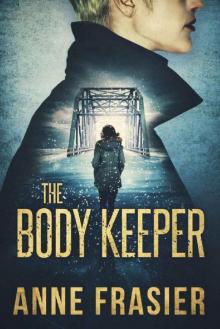 The Body Keeper
The Body Keeper Hush
Hush Play Dead
Play Dead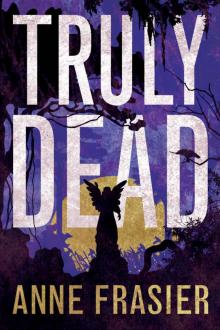 Truly Dead
Truly Dead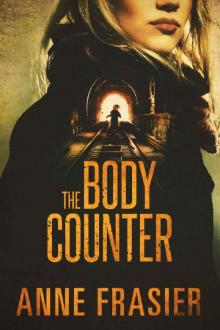 The Body Counter
The Body Counter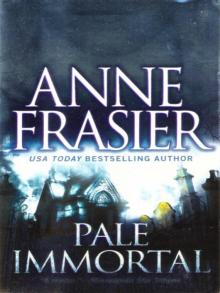 Pale Immortal
Pale Immortal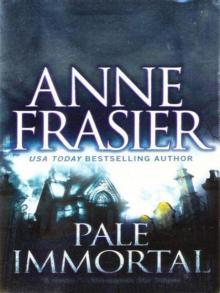 (2006) Pale Immortal
(2006) Pale Immortal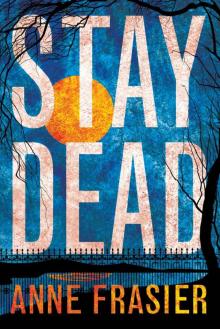 Stay Dead (Elise Sandburg series)
Stay Dead (Elise Sandburg series) Sleep Tight
Sleep Tight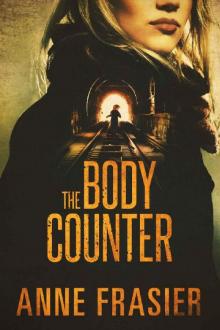 The Body Counter (Detective Jude Fontaine Mysteries Book 2)
The Body Counter (Detective Jude Fontaine Mysteries Book 2)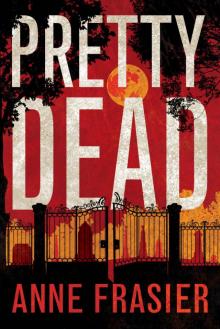 Pretty Dead
Pretty Dead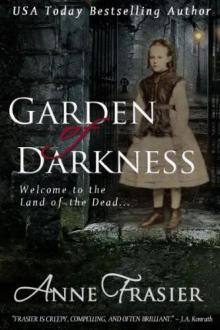 Garden of Darkness
Garden of Darkness